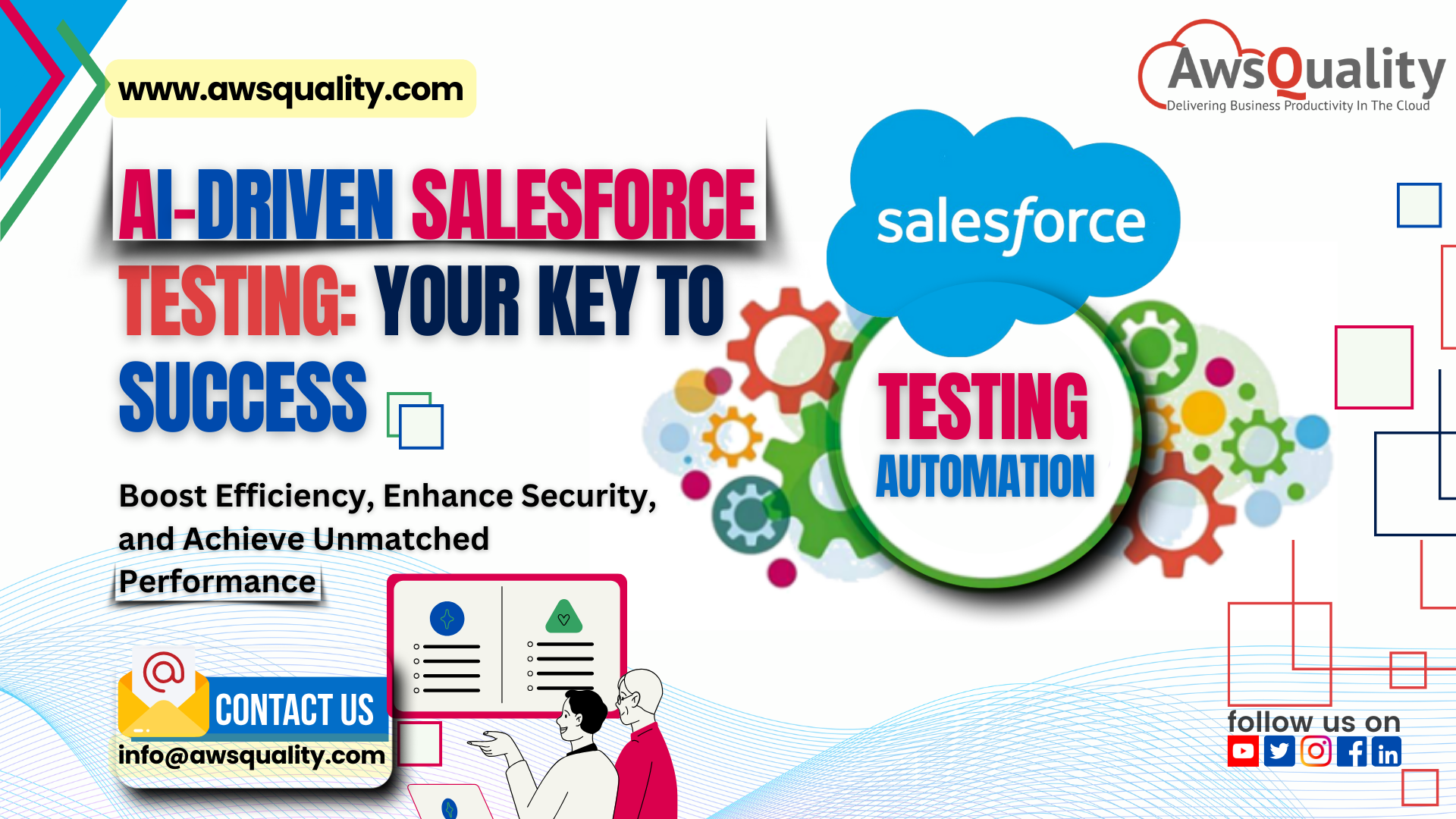
By 2024, modern business needs and major technology advancements will have completely changed Salesforce testing (Salesforce testing automation). Businesses must change to remain competitive, whether it’s through testing powered by AI or better mobile accessibility. Find out how these trends can help you keep your competitive edge and improve your Salesforce apps.
Optimize Efficiency, Enhance Security, and Ensure Seamless Performance with AwsQuality Technologies
Important Trends in Testing Salesforce:
- AI-powered testing: utilizing artificial intelligence to automate and enhance testing processes.
- Shift Left Testing: Testing [shift-left] is incorporated earlier in the development cycle in order to quickly detect problems earlier.
- Test Automation: Increasing the scope of automated testing to boost productivity and coverage.
- [CI/CT]: Making sure testing is a part of the pipeline for continuous integration and deployment is known as continuous integration and testing, or CI/CT.
- Security testing: Stressing the significance of security in data and privacy protection testing.
- Enhanced Mobile Accessibility: With more people using Salesforce through mobile devices, attention is being paid to the mobile experience.
- Privacy and Test Data Management: Keeping test data private while still adhering to legal requirements.
- Emphasis on Edge Computing and IoT: Examining Salesforce’s compatibility with edge computing hardware and IoT networks.
These trends need firms to do more thorough Salesforce testing, concentrating on automation, security, and performance across various platforms and devices. Maintaining a competitive edge and providing a seamless user experience will depend on Salesforce apps meeting these contemporary needs.
Concerning testing driven by AI.
Salesforce’s AI-powered testing is a revolutionary method that increases the efficacy, precision, and efficiency of testing procedures by utilizing automation and machine learning. The following are some salient features of Salesforce’s AI-powered testing:
- Automated Test Case Generation: Compared to manually developing tests, AI can generate test cases automatically based on product requirements and user stories, saving a significant amount of time and effort.
2. Self-Healing Tests: Artificial intelligence algorithms have the ability to recognize alterations in an application and self-correct test scripts to minimize maintenance and guarantee that tests are still pertinent. - Predictive Analytics: With the help of predictive analytics, which uses historical data analysis to identify possible problem areas, testers can concentrate on the application’s high-risk features.
- Enhanced Test Coverage: Artificial intelligence (AI) makes it feasible to obtain more thorough test coverage, including intricate scenarios that manual testing could miss.
- Faster Feedback Loop: AI-driven testing solutions can give developers feedback quickly, facilitating the resolution of problems and iteration cycles more quickly.
- [AI/IBT] Artificial intelligence or Intent-based testing: With the use of artificial intelligence (AI), intent-based testing (IBT) is a cutting-edge method that makes it possible to create tests that closely resemble the expected behavior of an application by determining the purpose behind a feature or user narrative.
- Optimized Test Planning: AI can help prioritize test cases according to risk, impact, and usage frequency, making sure the most important tests are run first.
- Visual Testing: By utilizing optical character recognition (OCR) and picture recognition, artificial intelligence (AI) can verify user interfaces against design criteria, guaranteeing visual coherence across various platforms and devices.
AI-powered testing is a major advancement in Salesforce application quality assurance. It makes testing more efficient while also facilitating a more proactive and astute approach to finding and fixing problems, which results in releases of improved quality. AwsQuality offers more information or services if you’re interested in investigating particular tools or approaches for integrating AI-powered testing in your Salesforce setup.
How can I begin using Salesforce’s AI-powered testing?
To guarantee a seamless and efficient transition, there are a few essential measures to take before implementing AI-powered testing in Salesforce. This is a comprehensive guide to help you get started:
- Recognize the Fundamentals: Learn about artificial intelligence (AI) and machine learning, particularly as they relate to testing. Find out which test kinds, including unit, integration, and end-to-end testing, can be automated.
- Select the Appropriate Instruments: Look into and choose testing tools with AI that work with Salesforce. Seek solutions with capabilities like predictive analytics, self-healing testing, and automated test case generation.
- Establish Your Testing Environment: Choose which AI-powered testing tools to integrate with your Salesforce testing environment. Make that you have access to Salesforce metadata and APIs, as well as the required permissions.
- Establish Your Testing Plan: Create a precise testing plan that details the objectives, parameters, and methodology for testing using AI. Select which test categories, such as smoke or regression tests, to automate initially.
- Requirements documentation and user stories: Make sure that every requirement and user story has a thorough documentation with precise acceptance criteria. This will make intent-based testing (IBT) easier, in which artificial intelligence (AI) creates tests according to the original purpose of a product.
- Teach Your Staff: Educate your staff on the new instruments and procedures. This involves being aware of how to maintain test scripts that are powered by AI and how to interpret test results that are created by AI.
- Commence Little and Large: To ensure that the AI-powered testing tools are effective, start by automating a limited number of tests. As you become more comfortable with the tools, progressively increase the number and complexity of tests.
- Monitor and improve: Keep an eye on how well your AI-powered tests are performing all the time. Make adjustments to your testing strategy based on comments and outcomes to increase test coverage and accuracy.
- Keep Up: Stay informed on the most recent advancements in testing and artificial intelligence. As AI develops quickly, keeping up with the latest developments will enable you to take advantage of new features and capabilities as they become available.
Remember that having the appropriate tools, a clear plan, and a team that is prepared to adopt new technologies are all essential for successful AI-powered testing. I may offer more advice if you require more specific details or help using any particular tools or techniques.
In conclusion,
Quality assurance for Salesforce applications is being revolutionized by AI-powered testing. AI helps find and fix problems quickly, leading to higher-quality releases, by improving testing’s efficiency and proactivity. AwsQuality Technologies can help if you’re prepared to investigate AI-powered testing methods or solutions for Salesforce. Come see us at AwsQuality Technologies
to find out more about our assistance in incorporating AI-driven testing 0into your Salesforce system. With our knowledgeable consulting and integration services, you can stay ahead in the fast-paced world of Salesforce CRM.




